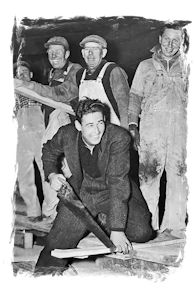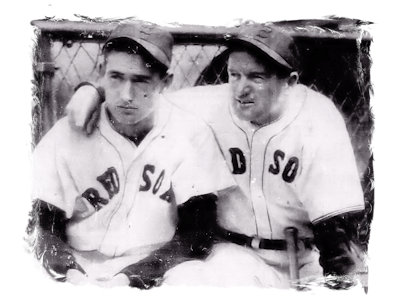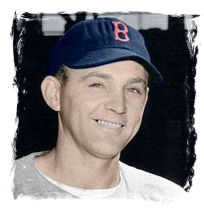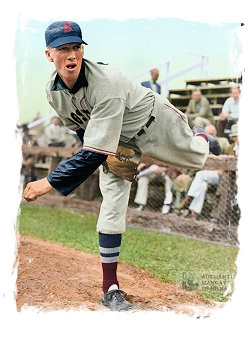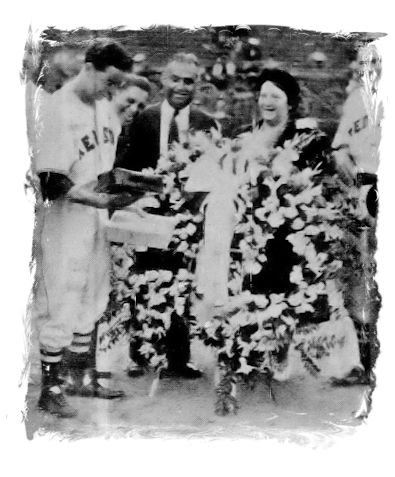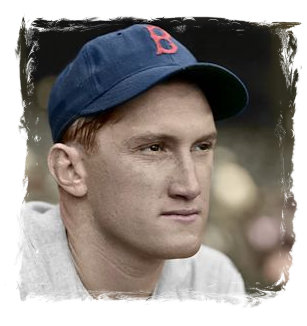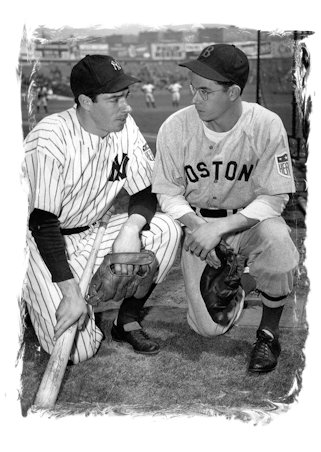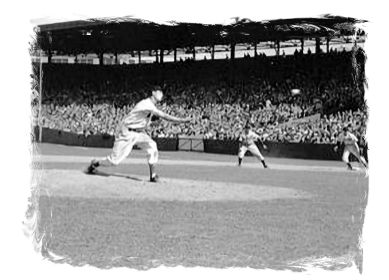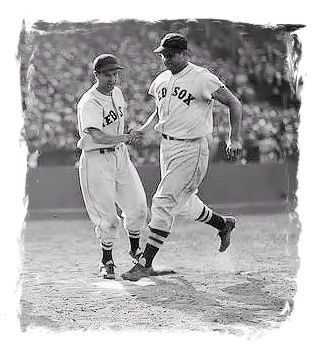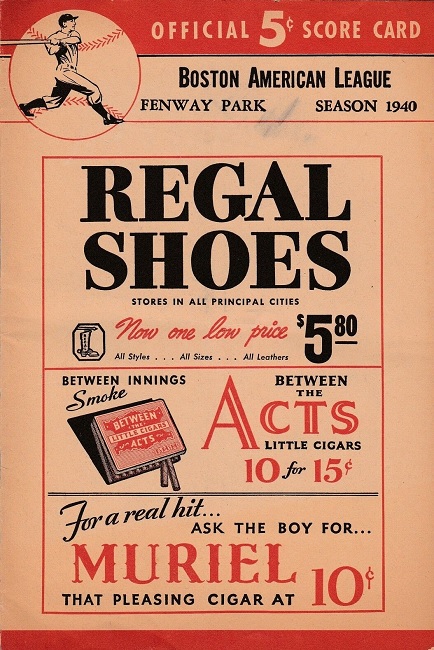With World War II raging in Europe, all of baseball prepared for the upcoming baseball season. For the Boston Red Sox, Tom Yawkey was so pleased with Ted Williams' rookie season that he doubled his salary to $10,000.
Construction of the new bullpens in right field and the reshaping of the grandstand was done during the winter to accomodate Ted's left handed power. The distance down thye right field foul line was shortened to 302 feet. The new bullpens in right field would shorten the distance for a home run, from 402 feet to 380 feet. The newspapers had labeled the short and right-field area as "Williamsburg". Prior to the start of spring training, Elden Auker was sold to the Browns and Joe Vosmik was shipped to the Dodgers. To replace them the Red Sox bought outfielder Dom DiMaggio and pitcher Larry Powell from the San Francisco Seals of the Pacific Coast League. It was planned that DiMaggio would be able to cover the more spacious right field of Fenway Park, so Ted Williams would be moved over to left field. Toward the end of last year, Jimmie Foxx had unwisely invested in St. Petersburg’s declining Jungle Club Golf Club . Florida’s Gulf Coast was experiencing a downward real estate spiral at the time, and Foxx had been duped into the ill-advised venture. Since Foxx loved playing golf in Florida, he had been an easy mark for business sharks trying to unload unprofitable properties. When the market failed to rebound, Foxx's life savings were lost, causing him to turn more frequently to the bottle. But going into spring training, Foxx seemed to have recovered from his appendectomy. And he was joined by the solid infield of Bobby Doerr, Joe Cronin and Jim Tabor. Rookie Dom DiMaggio had to fight to get his job. He was concerned that he might not get to play because the Sox were loaded with good outfielders: Ted Williams in left, Doc Cramer in center, and Lou Finney in right. Throughout his life DiMaggio had to overcome adversity and prejudice, about his size, his eyesight or his ethnicity. He never knew for sure that whether he was getting to play because of his last name and his brother Joe. He overcame it all however with talent, passion and purpose. He was quiet and reserved from the start but was observant and studied the game. He was confident of his abilities and had a solid spring.
However, in the first exhibition game against the Reds, Dom suffered a setback when he hurt his ankle sliding into home, trying to miss Johnny Peacock who had slid over the plate a second before. He missed the remainder of the games in spring training and remained on the bench when he was healed, because Lou Finney was weilding a very hot bat. On April 13th, Ted Williams put on a show in batting practice, hitting fifteen balls into the new bullpens. But with the bullpens in right field, he tried to hit home runs, ended up hitting pop-ups and slumped, getting only two hits in five games. As a result he heard boos from the fans and his attractive boyish charm of the year before, turned dark. Joe Cronin was the one who had to deal with all the Ted Williams issues, and had to call him out a number of times for his lack of hustle. Cronin however, never benched his tempermental superstar believing that in spite of his behavior, Ted was helping the team more than he was hurting them.
Lefty Grove opened the season with a two-hit 1-0 shutout in Washington on April 16th. He pitched no-hit ball until the eighth inning when he allowed two singles, following an error by Ted. He faced just twenty nine batters and won his own game with an RBI single in the second inning. The next game, Jim Bagby shut-out the Nats, 7-0. He allowed five scattered hits and only one runner reached third base. Jimmie Foxx knocked out his first homer of the year. In the first game of a Patriots Day doubleheader with the Philadelphia A's at Fenway on April 19th, Dom DiMaggio slugged his way into the hearts of the Fenway faithful. He slapped a two-out, two-strike, two-ball double in the sixth inning that gave the Sox the winning runs in a 7-6 victory. But Dom was spending more time on the becnch. Even with his ankle better, Cronin continued to play the veteran Lou Finney. On April 23rd, rookie Mickey Harris coasted to his first major league win, beating Washington, 7 to 2. Emerson Dickman tosssed a gem at the New York Yankees on April 26th, winning 8-1. The sole Yankee run came when Ted Williams carelessly dropped a fly ball and Joe Cronin bobbled a grounder in the ninth inning, both of which cost Dickman a shutout. In Philadelphia, Jim Tabor blasted a home run in the 12th inning to snap a tie game and give his Red Sox a 5-4 win on April 28th. Denny Galehouse pitched a great game until the bottom of the ninth when the A's scored three runs to send the game into extras. The Sox pounded out 19 hits the next day to give Mickey Harris his second win. Harris allowed five scattered hits in the 11 to 3 win and got two hits himself. Jim Tabor knocked out another home run and Ted Williams came through with two triples and two singles in four times up. Lou Finney had three singles and a double.
Jimmie Foxx's fifth homer of the year and Joe Cronin's two hits, that drove home four runs, put the Red Sox out front and eventually gave them a 12-4 win over the White Sox at Fenway, to begin the month of May. On May 3rd, Jim Tabor hit two home runs against the St. Louis Browns at Fenway Park. His second tied the game in the ninth. In the 10th, he singled with the bases loaded for the walk-off win. The Sox sent 10 batters to the plate in the third inning to turn a 3-1 deficit into a 7-3 lead over the Cleveland Indians on May 6th starting a six game winning streak and taking over first place in the American League. Jimmie Foxx came through with a triple in the fifth inning, with the bases loaded and scored on Joe Cronin's sacrifice fly a moment later, giving the Sox a 5-2 lead over the Tigers on May 9th. But Denny Galehouse couldn't hold the lead and the Tigers took the game into overtime. Then after Cronin doubled in the 10th inning and two walks loaded the bases, Johnny Peacock lined a walk-off single to give the Sox the 6 to 5 victory. At Yankee Stadium, not a Red Sox run was driven across by a base hit. Two of their runs, including the winning run in the tenth inning, were unearned as the Yanks committed three costly errors. Jack Wilson held the fort for the third time in a week, to preserve a 3-2 win on May 10th.
The next game went into the 11th inning with the Sox and Yankees tied at 7-7. Jim Tabor started with a double, was bunted to third and scored on a sac fly in the eleventh. Lou Finney then doubled and scored on Doc Cramer's base hit. When the dust settled, after Tommy Henrich homered in the bottom half of the inning, the Sox had won again, 9 to 8. Jimmie Foxx was the first batter up in the 10th inning and he lined a 425 ft home run into the center field seats of Comiskey Park. It was his second homer of the game and it provided the Red Sox with a 7-6 win against the White Sox, on May 14th. It was the fourth extra inning victory for the Bosox in the last five games. On May 16th, the Sox big bats unloaded six hits for five runs before anybody was out in the third inning in St. Louis. They managed to outlast the Browns for a 7-5 win. It was their eighth victory in the last nine games and it gave them a three game lead in the American League. Lou Finney's three singles and a homer boosted his batting average to .400 Jimmie Foxx pounded his way into the record books alongside Babe Ruth and Bill Dickey. He did it by slugging his second grandslam homer, in as many days, to down the Detroit Tigers 11-8 on May 21st. Over 3000 miles away, on May 26th, the German army pushed the British into the sea at Dunkirk. In a Memorial Day doubleheader in New York on May 30th, the Sox and Yankees split. After being shutout by Red Ruffing, 4-0, the Sox exploded in an 11-4 bombardment. Joe Cronin blasted a three run homer into the left field second deck to start a Sox scoring spree. Lou Finney, the Sox leading hitter, set the pace with five base hits in six times up in the second game.
At the start of June, Ted Williams was batting .374, had four homers and none into "Williamsburg". On June 2nd, the Red Sox and White Sox split a doubleheader at Fenway. The Bosox lost the first game, but a wild finish in the nitecap resulted in a 10-8 come-back win. Bobby Doerr's two run homer in the bottom of the eighth inning tied the game. They grabbed an 8-7 lead later in the inning when Lou Finney's single brought home Johnny Peacock. But the White Sox bounced right back in the top of the ninth, to tie the game back up. Then in the bottom of the ninth, with Ted Williams on base, Jimmie Foxx bounced a fly ball off the center field flag pole, that caroomed over the wall for a walk-off two run homer, Foxx came through in dramatic fashion again, on June 6th. With two on and two out in the ninth inning and the score tied, he slugged his 14th home run to lead the Red Sox and Lefty Grove to a 3-1 decision. Grove pitched a complete game for the first time this season and held the Browns to six hits.
Tributes to Lefty Grove began with a dramatized radio program entitled "Highlights in the life of Lefty Grove". Then on June 8th, there was a pregame presentation to him at Fenway Park. His family along with Boston mayor, Maurice Tobin, and Will Harridge, President of the American League, were there to honor him. At night Lefty was honored by all his teammates with a banquet at the Copley-Plaza hotel. On June 11th, the Sox knocked Bob Feller out of the game in a 9 to 2 win over the second place Cleveland Indians. Ted Williams hit a triple and a home run that brought home four runs. Joe Cronin was 2-for-3 with a single and a home run. Bobby Doerr singled and doubled, and Lou Finney got four hits, including two doubles. Captain Jimmie Foxx led the attack against the Indians the next day. His 8th inning double with Doc Cramer and Finney on base, brought them both home to tie the ball game at 5-5. The Sox went on to beat Cleveland, 9 to 5. Foxx was 3-for-4 in a 5-1 win in Chicago on June 14th. He hit his 15th homer the next night, as he and Ted, who was 3-for-4 with a home run, led the Bosox to a 5-2 win. The Red Sox completed a sweep of the White Sox, taking both ends of a doubleheader on June 16th. Ted cracked a game winning home run in the 12th inning of the first game, to provide a 4 to 3 win. In the second game was a 14-5 laugher. Cronin had a pair of homers as did pitcher Jack Wilson, Ted doubled and tripled, while Foxx also knocked a ball out of the park. The two home runs by Wilson were the last of his professional career, but they made him one of only 23 American League pitchers to homer twice in the same game. The Red Sox sixth straight win put them ahead by 2 1/2 games in the American League. But then they lost seven straight games and fell into third place on June 23rd. On that day's game, Ted Williams suffered a concussion and was hospitalized, as he collided with Doc Cramer, while chasing a fly ball in a game in Detroit. Dom DiMaggio came in to take Ted's place in a doubleheader and went 5-for-9 in the two games. On June 24th, France surrendered to Germany and two weeks later the Luftwaffe commenced bombing London. A split of a doubleheader in Detroit on June 25th, put the Sox four games behind. In the opener the Sox had 15 hits including four hits apiece by Lou Finney (.364 BA) and Jim Tabor, winning 11-7. Joe Cronin doubled and homered. In the final game of the road trip, on June 26th, Detroit pitchers held Sox batters hitless for eight innings. But in the ninth, Finney doubled and Foxx singled. Tabor and Cronin followed them with singles. The Sox scored three runs and had a 3-1 decision. The Sox took two games from Washington in a doubleheader, on June 30th. After losing the first two games of the series at Fenway, Lefty Grove guided the Sox to a 6-5 win in the opener. The Sox jumped out to a four run lead but things got tight in the ninth. With two outs and the Sox up by three runs, the Nats scored two runs off Lefty. Finally, Joe Heving came in to save the game.
In the second game with Washington, up 4-2 going into the bottom of the eighth, the Sox rallied. With Joe Glenn on first and one out, LFinney doubled, Cramer singled bringing home Glenn, and Williams doubled bringing home Finney to tie the game. Foxx was intentionally passed to load the bases. Jim Tabor's ground ball was good enough to bring Cramer home with the game winner, 5 to 4. On July 1st, it was "Dominic DiMaggio Day" at Fenway Park. Even though he was a rookie, he realized it was just a way for the Red Sox to sell more tickets. Nineteen hundred boys of Italian descent and junior members of the "Sons of Italy" presented him with presents. The following day the A's and the Sox split a doubleheader. After losing the first game, the Sox rallied and blasted Philly, 15 to 9. The Red Sox scored five runs in the first inning when Bobby Doerr's pop-up fell safely in the middle of two A's fielders. Foxx and Cronin both homered and Lou Finney belted a two-run triple. On top of all of that, Ted Williams was booed loudly when he loafed after a double. For the remainder of the afternoon, every move by Ted was greeted by noisy comments from the crowd. The drama continued when Ted swore at the fans who were riding him.
A six-run ninth inning at Fenway, led by
Williams and
Foxx gave the Sox an
improbable 12-11 win against the A's on
July 3rd. Ted The Sox were in Washington on July 5th. They received a complete game pitched by Jim Bagby and coasted to a 9 to 4 triumph, backed by Jimmie Foxx's 20th homer and by Ted Williams' 11th of the year. Lou Finney (.384 BA) doubled and tripled the next day, as the Sox beat the Nats 5 to 3. The Sox and Washington split a doubleheader on July 7th. Lefty Grove coasted to an easy 7 to 1 victory in the opener. He would never have been in trouble if his fielders were better, and would have hurled a shutout. Finney had the big bat again with a 3-for-4 afternoon. Joe Cronin was named to mange the American League All Stars at the game in Sportsman's Park in St. Louis. Jimmie Foxx and Ted Williams were named starters, and Cronin added Finney and Cramer to the squad. The American League lost 4-0, getting just three hits. Bobby Doerr came up in the 13th inning on July 11th and blasted one of Johnny Rigney's fastballs well up into the left-field screen at Fenway, giving the Red Sox a thrill filled 3 to 2 walk-off triumph over the White Sox. After losing a doubleheader to the White Sox on July 13th, the Bosox fell five games behind. But they then won five straight and were 1/2 game out of first on July 17th.
Dom DiMaggio got his chance to start in the Sox outfield when Lou Finney went head over heels after being tagged out at first base and twisted his knee badly. He received a trophy for being the Pacific Coast League's MVP in 1939 in a ceremony before a July 14th doubleheader with the Browns. Dom scored the winning run in the 11th inning of the first game, when he scored from first base on Doc Cramer's walk-off double. The Sox won the second game, 7 to 3. Jim Tabor played in both games and went 4-for-8 with a double, three RBIs, and a stolen base. The next day, Tabor banged out three singles, stole a base and scored two runs, in a 10-6 Sox victory. Tabor went on a home-run tear, hitting four in three games between July 23rd and July 26th. He had eight RBIs in the three games, going 6-for-12 and had six hits in six plate appearances over the course of two games, July 25th and 26th. During that period, however, the Red Sox lost nine of their ten games and fell out of the race, seven games behind, in third place. Lefty Grove also injured his ankle, missed some time and his injury was attributed to the slide of the Red Sox in the standings. The Sox got back on the winning track in St. Louis on July 26th, winning 14 to 7. Ted Williams smacked his 13th and 14th homers to pace the 19 hit attack. Two days later the Sox swept a doubleheader from the Browns. In the second game, Bobby Doerr belted out a pair of homers.
On August 1st, Fritz Ostermueller beat the Indians and Mel Harder, 5-2. Ostey logged a complete-game seven-hitter. Jimmie Foxx, after coming back from his knee injury, filled in at his old position as catcher and slammed a two-run homer. Joe Cronin hit for the cycle for the second time in his career on August 2nd. Dom DiMaggio brought in four runs with a single and a homer as the Sox beat the Tigers in Detroit, by a score of 12 to 9. Then on August 4th, Ted Williams and Jimmie Foxx helped Lefty Grove beat the Tigers, 7 to 3. Ted tripled against the center field wall with the bases loaded and Foxx blasted his 24th homer. The Sox returned home to face the Yankees on August 5th. Foxx hit his 25th homer with Cronin aboard in a 4-1 win. It was his fourth homer in the last six games. In the next game the Sox got 14 hits, good for 20 bases, beating the Yankees again, 8-3. Finney and Cronin each had three hits and drove in five of the runs between them. The two teams then split a doubleheader on August 7th. The Sox had to fight from behind in both games, The overcame a three run deficit in the opener to win 10-7. They erased another three runs in the second game, but the Yankees came from behind in the ninth to take that one, 6 to 3. Cronin had homers in each game with his second one tying the game at three each in the late game. Finney, Cronin and Dom DiMaggio collected four hits each. In the series finale, on August 8th, Cronin unleashed a home run, with Dom on board to walk-off a 6 to 5 win for his Red Sox. Dom started the Sox rally with his fourth hit of the game to get on base. Not only did he lead the Sox offensive attack, but he made an amazing over the shoulder catch on the deads run, to rob Tommy Heinrich of extra bases.
Dom had fond memories of the Red Sox-Yankees games, and especially with the media interest in the DiMaggio brothers in center field. Because each team had one of the DiMaggio brothers, the sibling rivalry added fuel to the Red Sox-Yankees rivalry. Dom had 11 hits to Joe’s nine in the five games, or as Dom said, “Twenty hits for the family in one series.” Earl Johnson spun a wonderful shutout in Washington on August 10th. He needed a little help to finish the game in the ninth inning, but got credited for a 3-0, five hitter. In an August 11th game, Sid Hudson had bested Lefty Grove, 2-1, in Washington thanks to the ninth-inning heroics of Buddy Lewis, who threw out pinch-runner Tom Carey, carrying the tying run. Down 2-0, Doc Cramer reached first on an infield hit and Foxx lined a single to left. Carey came in to run for him and Finney slammed a ball against the right field wall. Cramer easily scored as Lewis chased down the carom. Carey charged home behind him but was tagged out on Lewis' perfect throw to Rick Ferrell. In New York, Joe DiMaggio advised his younger brother to move back because the ball carried well in that part of the ballpark. So, on August 14th, Dom, taking Joe’s advice, was able to run down two fly balls hit to deep center, off the bat of brother Joe. In the third inning, Dom was also to throw the out Tommy Henrich at third for a doubleplay. According to Dom, on his way out to center after the second fly ball out, Joe called him a "little heel" as they passed each other. The Sox lost three straight at Yankee Stadium but bombed the bombers on the final day, August 15th, 11 to 1. Joe Heving held the Yankees to three scattered hits in his first start of the season. Both Williams and Foxx homered, bringing home seven of the runs. Dom, Doc Cramer and Joe Cronin, each collected three hits. On August 16th, Foxx hit two home runs against the Washington Nationals, his 30th and 31st at Fenway. The second one was a walk-off game winner in the 10th inning, giving the Sox a 7-6 win. With those, he became the first player in major league history to hit 30 or more homers in 12 consecutive years. And it put him in second place behind only Babe Ruth with 495 homers, passing Lou Gehrig on the career home run list. The next day, the slugfest continued in Washington. The Sox collected 18 hits beating the Nats 12 to 9. Ted had two doubles and a triple. Foxx homered again and doubled as did Dom DiMaggio. Cronin also homered. Earl Johnson put together his first complete major league game in a 4 to 2 beating of Washington in the series finale on August 18th. Bobby Doerr and Dom homered in the seventh inning to sew up the victory. The Sox won their fifth straight by out-hitting the Indians on August 19th, 16 to 7. Foxx turned in his 33rd home run and also contributed a double and a single. Ted slugged his 18th homer and Doerr chalked up his 16th. But it was Jim Tabor who banged out a grandslam, which was his 20th homer of the year. Before a game against Cleveland at Fenway Park on August 21st, Tabor collapsed on the field and was taken to the hospital for an emergency appendectomy.
Ted Williams had been pestering Joe Cronin to let him pitch. Ted liked to brag about his youthful pitching exploits and when the first game of a doubleheader against the Tigers turned into a 12-1 blowout on August 24th, Cronin decided that it was time for Ted to put up or shut up. Ted threw two innings of relief in the first game, faced nine batters, allowing three hits and a run. The highlight was striking out Rudy York on three pitches and he left the game with an ERA of 4.50. The second game of the doubleheader was closer. In the bottom of the ninth, the Tigers were ahead 7-6 with Dizzy Trout pitching. Williams and Doerr both singled. With two outs Finney singled and drove home Ted with the tying run. Trout next walked Johnny Peacock to load the bases. With Tom Carey at the plate, Trout then uncorked a wild pitch and Doerr came home with the winning run, 8 to 7. Eleven runs were scored in the sixth inning during the second game of a doubleheader with the St. Louis Browns on August 25th. The Sox lost the first game, but won that won by a 17 to 3 score. Jimmie Foxx's 34th home run was a grandslam and it was his third one of the season. He also banged out two doubles. Pitcher Jack Wilson was up twice in the inning and registered two hits. The Red Sox took a game that was a gift from the Chicago White Sox on August 29th. In the ninth inning, with the bases load and the score tied a three apiece, White Sox pitcher Johnny Rigney walked Joe Cronin. Dom DiMaggio trotted home with the run that won the game, 4 to 3. Ted Williams tripled with Doc Cramer on base, to break a tie game and give the Sox a 5-4 win in Philadelphia on August 30th. Joe Heving won the game in relief, after coming in during the fourth inning and holding the A's to just two hits for the remainder of the contest. Lou Finney and Dom DiMaggio each had three hits the next day as the Sox beat the Athletics again, 10 to 6. They finished the month in fourth place, 6 1/2 games behind.
Lefty Grove lost a heartbreaker on September 2nd, 1-0, in thirteeen innings, to the Washington Nationals. The Red Sox had stranded ten runners.. He had lost by one run in his last two starts. Cramer had four hits however, including a double and a triple. On September 4th, the Red Sox came from behind in both ends of a marathon doubleheader, to take a pair of extra inning decisions from the Philadelphia Athletics, 6 to 5 in 10 innings and 5 to 4 in 11 innings before 5600 fans at Fenway Park. Ted Williams' bad behavior reached a climax that day. Ted had misjudged a line drive that went over his head for a double, got picked off first base and failed to run out a pop-up that looked foul, but landed in fair ground. In the seventh inning of the second game, he picked up a ball that had gone foul and threw it at a bunch of photographers. The ball hit one of them and at that point the press had had enough of him. The gloves were off. The reporters who had fawned over him during his rookie year showed him no mercy from then on. Unlike his counterpart on the Yankees, Joe DiMaggio, who didn't take the bait when the press got on him, Ted lashed out and fought back. He felt his manhood and abilities were being challenged. Ted pouted and played with indifference and his life-long battle with the sportswriters and fans began. His attitude annoyed all around him, including Tom Yawkey. By the end of the season, Ted had told reporters that he hated Boston and wanted to be traded. At one point, he decided he would never again tip his hat to the crowd, a non-gesture that lasted for the rest of his career. Most of his teammates considered him a spoiled brat. For two innings the Red Sox and A's beat each other up in a game on September 5th. In the second inning the Red Sox sent 10 men to the plate and scored six runs. The very next inning, the A's sent up 12 batters and slapped out seven straight hits to take a 7-6 lead. Then Earl Johnson took the ball and pitched two hit ball for the next 6 2/3 innings. The Sox proceeded to put up three more runs and won 9 to 7. Joe Cronin made the big noise for his Sox with three doubles during the contest. On September 10th, with his ankle still bothering him, Lefty Grove pitched 13 innings in Detroit, to beat the Tigers 6 to 5. He singled in the 12th inning, refused a pinch runner and hobbled around the bases to score a run. And he struck out Rudy York to end the game in the 13th inning. Tom Carey drove in seven runs, one of them a single in the 13th inning that won the game. Jim Bagby two-hit the first place Indians at Cleveland on September 13th, but lost 1-0. The lone run came on a grounder that Joe Cronin should have fielded cleanly and a bobble by Doc Cramer on the base hit that followed. Earl Johnson only allowed the Tribe four hits the next day, with the Sox winning that one, 6 to 1. A titanic two-run triple by Ted Williams at Comiskey Park gave the Red Sox a 6 to 2 win over the White Sox. Four errors by Chicago also figured in the Bosox scoring on September 16th. On September 21st, precisely one month after his appendectomy, Jim Tabor was back in the lineup and went 3-for-4 with an RBI. The Red Sox were 12-16 with Tabor out of the lineup and by the time he came back, were eliminated from the pennant race.
On September 24th in Philadelphia the Sox swept a doubleheader. In the opener, Ted Williams, Jimmie Foxx and Joe Cronin belted three successive homers to tie a major league record. After Bobby Doerr tripled, Jim Tabor added a fourth home run in that inning. The Sox also also set a major league record for extra base hits in a game with 14, by driving out five doubles, three triples and six homers. In the process the Red Sox walked all over the A's 16 to 8 in the first game of a doubleheader. The second game belonged to the Red Sox also, by a 4 to 3 score. The homer that Foxx hit in the first game was his 500th. Many assumed that, being second on the all-time home run list, Foxx would ultimately surpass Babe Ruth’s record total of 714. Doc Cramer retrieved the ball and gave it to Foxx, knowing it was a special moment. With a plethora of hits of all descriptions, the Red Sox defeated Washington at Fenway Park in the final game of their series by a score of 24 to 4 on September 27th, making a new record for the total number of runs scored in a game. The Sox followed that by blasting the Philadelphia A's by scores of 16-4 and 8-1 in a doubleheader the next day. In the first game Ted Williams was 4-for-4; Dom DiMaggio had four hits also with a home run; Joe Cronin had three hits; and Jimmie Foxx had a double and a triple. Jack Wilson allowed only three hits in the second game to finish off quite a satisfying day. Ted had three hits including a triple and his 23rd home run the final day in the opening game of another doubleheader on the final day of the season on September 29th. Ted, along with Foxx and Dom DiMaggio had three hits in the 9 to 4 win. Cronin stole home in the sixth inning of the second game, a 4 to 1 win. The Sox finished the season strong by winning seven of their last eight games, but finished in fourth place with an 82-72 record, taking a step back, winning seven fewer games than the year before. Though the pennant eluded the Red Sox again, they showed the most potential since the 1912-1918 championship years. Ted Williams, Jim Tabor, Bobby Doerr and now Dom DiMaggio were the young nucleus that Tom Yawkey thought would challenge in years to come. Attendance at Fenway Park soared to 716,234, the first time in franchise history that the Red Sox drew more than 700,000 fans. By the end of the season, Ted batted .344 with 23 homers, and 113 RBIs. But his numbers were way down from those he produced in his rookie year. Only nine of his homers were hit at Fenway Park. But the story of the season was Ted's psychic tailspin, and evolving public meltdown that had been played out and shaped by the Boston press. One bright spot was Bobby Doerr ,who batted a steady .291 with 69 extra base hits, including 22 homers, 37 doubles and 10 triples. He had established himsef as a middle of the order slugger and led the league in double plays, turning 118 of them. His 401 putouts also led the AL. Personality-wise, Doerr was everything that Williams was not. He kept his head down and went about his business and worked hard to get better and better. Their starting infield was the only one in baseball history to have all four players hit over 20 home runs: Jimmie Foxx (36 HRs), Bobby Doerr (22 HRs), Joe Cronin (24 HRs) and Jim Tabor (21 HRs). Jim Tabor had career highs in home runs and slugging percentage (.510). He hit .285 in 120 games with 28 doubles, 6 triples, and 14 stolen bases. He also improved in the field, but still had the most errors (33) in the American League. Joe Cronin had another fine year at the plate, scoring 104 runs and driving in 111, to go along with 24 home runs. In the field his stats were right at the league average. In spite of a broken finger in spring training, courtesy of Cincinnati’s Johnny Vander Meer, and a nagging cold, Lou Finney enjoyed another fine season. He played in the outfield in place of the injured Dom DiMaggio, and hit so well that Cronin postponed DiMaggio’s return, before Finney himself suffered a leg injury. When he came back, he moved to first when Foxx injured his knee in a collision. When Foxx returned, Cronin asked his team captain to catch for the slumping Gene Desautels, which allowed the him to keep both Finney and DiMaggio in the lineup. Foxx was the regular catcher for six weeks or so, and appeared in 42 games behind the plate. In either position, Lou Finney hit well. He was the first major-league player to record 100 hits, ranked among the league batting leaders through the summer, and finished with a .320 average, ninth best in the AL. Finney and tied for second in the league with 15 triples, a career best for Finney, who also achieved personal highs with 31 doubles and 73 runs batted in. He scored 73 times and was the AL’s toughest man to strike out, fanning just once per 41.1 at-bats. Despite his health issues, Jimmie Foxx was still one of America’s most successful athletes. Tom Yawkey enjoyed Foxx’s company and shared many of his favorite activities. According to one story, the player avoided a fine from Joe Cronin for missing a curfew when he returned to the hotel lobby in the early morning with the owner in tow. Some have surmised that the length of Foxx’s career was curtailed by his drinking, and it certainly did not help. It seems much more likely that it was a diminished batting eye caused by the beaning and related sinus problems that led to his decline. As his pain increased, so did his drinking. Foxx frequently played through injuries that would have sidelined other players, and eventually this took a toll as well. His batting average dipped to .295, but he remained an all-star slugger, driving in 119 runs both years and hitting 36 home runs. Foxx was a victim of his superb athleticism, and was often obligated to change positions. As a result, he never acquired much standing in any particular spot. Ted Williams watched all this unfold, and never forgot his team spirit and stalwart tenacity. He later said that next to Joe DiMaggio, Jimmie Foxx was the greatest player he ever saw. It was a satisfying season for rookie Dom DiMaggio. He and Foxx had shared an apartment together and the two had developed a great friendship and respect for each other. In August they were tied for the team batting lead at .313. Dom went on to hit .301 with 46 extra base hits in only 108 games. Altough they were an offensive juggernaut with a .286 team batting average, and had four players drive in over 100 runs (Foxx, Williams, Cronin, and Doerr) their lack of pitching was again the big problem. Red Sox pitchers allowed 47 more home runs than they had the year before. Lefty Grove was injued most of the season and his effectiveness was near an end, but with a team best 3.99 ERA and a 7-6 record, he ended the season just seven wins short of his 300th. Jim Bagby, the only pitcher who threw more than 160 innings, finished 10-16. Grove and Bagby led the team with over 21 starts each. Jack Wilson and Joe Heving led the team with 12 wins each, but only started 23 games combined. Sixteen different pitchers started at least one game after that. The problem wasn't that any of the regular pitchers were particularly awful, but rather that no one truly excelled. The team ERA for the season was 4.89 With the war raging in Europe, President Franklin Roosevelt signed the Selective Service Act into law on September 16th, initiating the first peacetime draft in the nation's history. Everyone's future was uncertain when the season ended.
|

